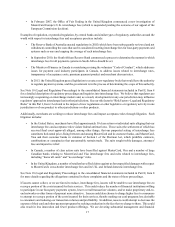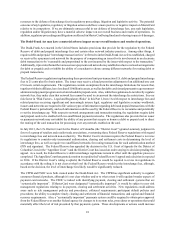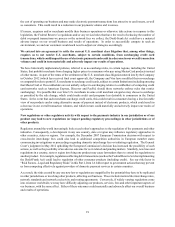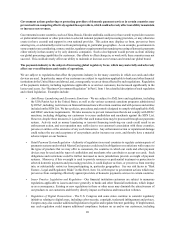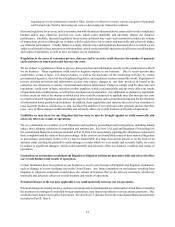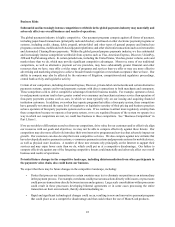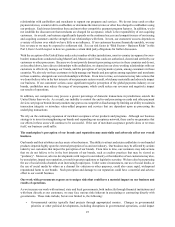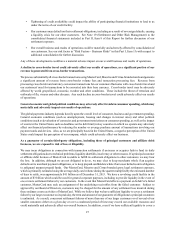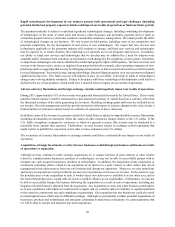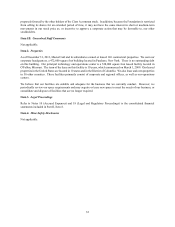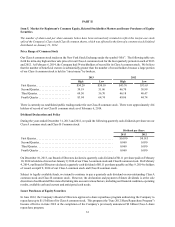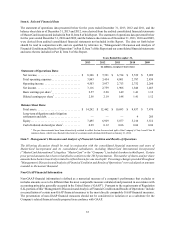MasterCard 2013 Annual Report Download - page 31
Download and view the complete annual report
Please find page 31 of the 2013 MasterCard annual report below. You can navigate through the pages in the report by either clicking on the pages listed below, or by using the keyword search tool below to find specific information within the annual report.27
• Tightening of credit availability could impact the ability of participating financial institutions to lend to us
under the terms of our credit facility.
• Our customers may default on their settlement obligations, including as a result of sovereign defaults, causing
a liquidity crisis for our other customers. See Note 19 (Settlement and Other Risk Management) to the
consolidated financial statements included in Part II, Item 8 of this Report for further discussion of our
settlement exposure.
• Our overall business and results of operations could be materially and adversely affected by consolidation of
our customers. See our risk factor in “Risk Factors - Business Risks” in this Part I, Item 1A with respect to
additional consolidation for further discussion.
Any of these developments could have a material adverse impact on our overall business and results of operations.
A decline in cross-border travel could adversely affect our results of operations, as a significant portion of our
revenue is generated from cross-border transactions.
We process substantially all cross-border transactions using MasterCard, Maestro and Cirrus-branded cards and generate
a significant amount of revenue from cross-border volume fees and transaction processing fees. Revenue from
processing cross-border and currency conversion transactions for our customers fluctuates with cross-border travel and
our customers' need for transactions to be converted into their base currency. Cross-border travel may be adversely
affected by world geopolitical, economic, weather and other conditions. These include the threat of terrorism and
outbreaks of flu, viruses and other diseases. Any such decline in cross-border travel could adversely affect our results
of operations.
General economic and global political conditions may adversely affect trends in consumer spending, which may
materially and adversely impact our results of operations.
The global payments industry depends heavily upon the overall level of consumer, business and government spending.
General economic conditions (such as unemployment, housing and changes in interest rates) and other political
conditions (such as devaluation of currencies and government restrictions on consumer spending, as well as the impact
of events in the United States such as deadlines on the debt limit) in key countries in which we operate may adversely
affect our financial performance by reducing the number or average purchase amount of transactions involving our
payment cards and devices. Also, as we are principally based in the United States, a negative perception of the United
States could impact the perception of our company, which could adversely affect our business.
As a guarantor of certain third-party obligations, including those of principal customers and affiliate debit
licensees, we are exposed to risk of loss or illiquidity.
We may incur obligations in connection with transaction settlements if an issuer or acquirer fails to fund its daily
settlement obligations due to technical problems, liquidity shortfalls, insolvency or other reasons. If a principal customer
or affiliate debit licensee of MasterCard is unable to fulfill its settlement obligations to other customers, we may bear
the loss. In addition, although we are not obligated to do so, we may elect to keep merchants whole if an acquirer
defaults on its merchant payment obligations, or to keep prepaid cardholders whole if an issuer defaults on its obligation
to safeguard unspent prepaid funds. Our MasterCard, Maestro and Cirrus-branded gross legal settlement exposure,
which is primarily estimated using the average daily card volume during the quarter multiplied by the estimated number
of days to settle, was approximately $41 billion as of December 31, 2013. We have a revolving credit facility in the
amount of $3 billion which could be used for general corporate purposes, including to provide liquidity in the event of
one or more settlement failures by our customers. In the event that MasterCard effects a payment on behalf of a failed
customer, MasterCard may seek an assignment of the underlying receivables from the failed customer. Subject to
approval by our Board of Directors, customers may be charged for the amount of any settlement loss incurred during
these ordinary course activities of MasterCard. While we believe that we have sufficient liquidity to cover a settlement
failure by our largest customer on its peak day, the term and amount of our guarantee of obligations to principal customers
is unlimited. As a result, concurrent settlement failures of more than one of our larger customers or of several of our
smaller customers either on a given day or over a condensed period of time may exceed our available resources and
could materially and adversely affect our overall business. In addition, even if we have sufficient liquidity to cover a


